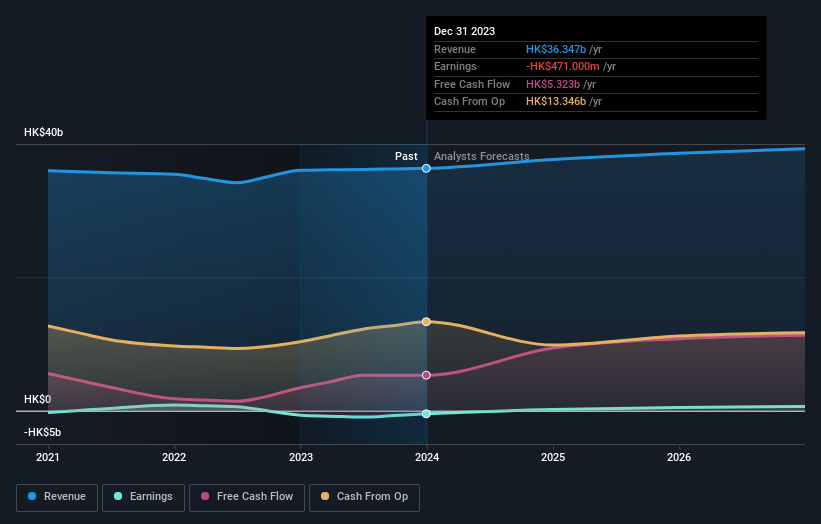Public companies own 41% of PCCW Limited (HKG:8) shares but retail investors control 41% of the company

Key Insights
- PCCW's significant retail investors ownership suggests that the key decisions are influenced by shareholders from the larger public
- 50% of the business is held by the top 4 shareholders
- 11% of PCCW is held by Institutions
A look at the shareholders of PCCW Limited (HKG:8) can tell us which group is most powerful. And the group that holds the biggest piece of the pie are retail investors with 41% ownership. In other words, the group stands to gain the most (or lose the most) from their investment into the company.
Meanwhile, public companies make up 41% of the company’s shareholders.
In the chart below, we zoom in on the different ownership groups of PCCW.
View our latest analysis for PCCW

What Does The Institutional Ownership Tell Us About PCCW?
Many institutions measure their performance against an index that approximates the local market. So they usually pay more attention to companies that are included in major indices.
As you can see, institutional investors have a fair amount of stake in PCCW. This implies the analysts working for those institutions have looked at the stock and they like it. But just like anyone else, they could be wrong. If multiple institutions change their view on a stock at the same time, you could see the share price drop fast. It's therefore worth looking at PCCW's earnings history below. Of course, the future is what really matters.

Hedge funds don't have many shares in PCCW. Pacific Century Regional Developments Limited is currently the largest shareholder, with 23% of shares outstanding. For context, the second largest shareholder holds about 18% of the shares outstanding, followed by an ownership of 6.9% by the third-largest shareholder. Tzar Kai Li, who is the third-largest shareholder, also happens to hold the title of Chairman of the Board.
On looking further, we found that 50% of the shares are owned by the top 4 shareholders. In other words, these shareholders have a meaningful say in the decisions of the company.
Researching institutional ownership is a good way to gauge and filter a stock's expected performance. The same can be achieved by studying analyst sentiments. Quite a few analysts cover the stock, so you could look into forecast growth quite easily.
Insider Ownership Of PCCW
While the precise definition of an insider can be subjective, almost everyone considers board members to be insiders. The company management answer to the board and the latter should represent the interests of shareholders. Notably, sometimes top-level managers are on the board themselves.
Insider ownership is positive when it signals leadership are thinking like the true owners of the company. However, high insider ownership can also give immense power to a small group within the company. This can be negative in some circumstances.
We can report that insiders do own shares in PCCW Limited. It is a pretty big company, so it is generally a positive to see some potentially meaningful alignment. In this case, they own around HK$2.1b worth of shares (at current prices). If you would like to explore the question of insider alignment, you can click here to see if insiders have been buying or selling.
General Public Ownership
The general public, who are usually individual investors, hold a 41% stake in PCCW. This size of ownership, while considerable, may not be enough to change company policy if the decision is not in sync with other large shareholders.
Public Company Ownership
Public companies currently own 41% of PCCW stock. We can't be certain but it is quite possible this is a strategic stake. The businesses may be similar, or work together.
Next Steps:
It's always worth thinking about the different groups who own shares in a company. But to understand PCCW better, we need to consider many other factors. Take risks for example - PCCW has 2 warning signs (and 1 which is potentially serious) we think you should know about.
If you are like me, you may want to think about whether this company will grow or shrink. Luckily, you can check this free report showing analyst forecasts for its future.
NB: Figures in this article are calculated using data from the last twelve months, which refer to the 12-month period ending on the last date of the month the financial statement is dated. This may not be consistent with full year annual report figures.
New: Manage All Your Stock Portfolios in One Place
We've created the ultimate portfolio companion for stock investors, and it's free.
• Connect an unlimited number of Portfolios and see your total in one currency
• Be alerted to new Warning Signs or Risks via email or mobile
• Track the Fair Value of your stocks
Have feedback on this article? Concerned about the content? Get in touch with us directly. Alternatively, email editorial-team (at) simplywallst.com.
This article by Simply Wall St is general in nature. We provide commentary based on historical data and analyst forecasts only using an unbiased methodology and our articles are not intended to be financial advice. It does not constitute a recommendation to buy or sell any stock, and does not take account of your objectives, or your financial situation. We aim to bring you long-term focused analysis driven by fundamental data. Note that our analysis may not factor in the latest price-sensitive company announcements or qualitative material. Simply Wall St has no position in any stocks mentioned.
Have feedback on this article? Concerned about the content? Get in touch with us directly. Alternatively, email editorial-team@simplywallst.com
About SEHK:8
PCCW
Provides telecommunications and related services in Hong Kong, Mainland and other parts of China, Singapore, and internationally.
Established dividend payer and good value.


